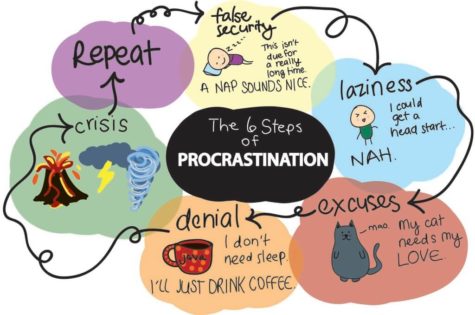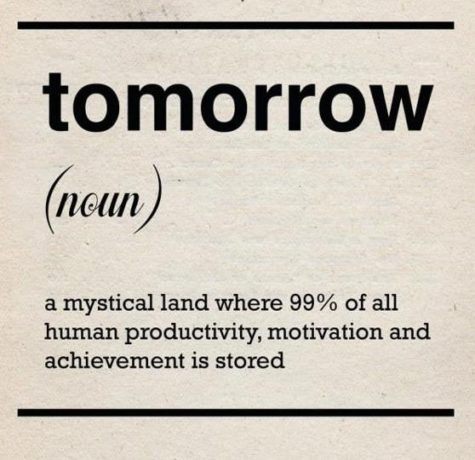Time Management and Organization at BCA
BCA, Procrastination, and the Brain
April 3, 2019
 Time management is always a topic that makes people groan. Nonetheless, we must face it. As students at BCA we are rather well acquainted with procrastination: papers submitted at 11:59, excuses to put off finishing things, and midnight study sessions are all frequently part of our school experience. Why we do procrastinate on the neurological level? What is BCA trying to do about this issue? What are some effective ways to avoid procrastination? People were drawn to the concept of procrastination long before the Internet age introduced distractions like Youtube, Snapchat, and Netflix raided our attention span. Although researchers found that around 20% of modern people are chronic procrastinators, evidence from historic texts dates more than 2000 years old show that procrastination is not solely an issue of the newest generation.
Time management is always a topic that makes people groan. Nonetheless, we must face it. As students at BCA we are rather well acquainted with procrastination: papers submitted at 11:59, excuses to put off finishing things, and midnight study sessions are all frequently part of our school experience. Why we do procrastinate on the neurological level? What is BCA trying to do about this issue? What are some effective ways to avoid procrastination? People were drawn to the concept of procrastination long before the Internet age introduced distractions like Youtube, Snapchat, and Netflix raided our attention span. Although researchers found that around 20% of modern people are chronic procrastinators, evidence from historic texts dates more than 2000 years old show that procrastination is not solely an issue of the newest generation.
Though procrastination is pleasurable at first, the effects later experienced can include increased levels of stress. One of the reasons why we procrastinate is because we naturally tend to do what is more pleasurable. Our brain is the real culprit of this phenomena. The brain has two specific regions responsible for procrastination. Typically, the prefrontal cortex is in charge of planning and decision making. The limbic system, on the other hand, controls emotions, particularly pleasure. The activities we perform while we procrastinate usually activate the limbic system, while the prefrontal cortex, often less developed, loses the battle.
A study by Dianne Tice and William Baumeister at Case Western Reserve University published in Psychological Science in 1997, evaluated students on a scale of procrastination and then tracked various parameters like stress, health, and academic performance throughout the semester. The researchers concluded that procrastination negatively affects the grades, stress level, physical, and mental health of a student. Another study conducted by Laura Rabin at Brooklyn College published in the Journal of Clinical and Experimental Neuropsychology in 2011, sought a connection between procrastination and the executive functioning of the brain. A group of 212 students was assessed on a scale for procrastination followed by an assessment for the nine clinical subscales of executive function: impulsivity, self-monitoring, planning and organization, activity shifting, task initiation, task monitoring, emotional control, working memory, and general orderliness. The researchers found a connection between procrastination and each of the subscales.
How does BCA deal with procrastination? Students have attempted to practice meditation or talk with counselors and teachers. Mrs. Villanova made an effort to create a time management chart describing the daily schedules of her students. Guidance counselors teach lessons and offer advice for how to take control of the tasks students must do. However, these efforts do not always solve the procrastination problem. Students roll their eyes and laugh when asked if BCA has a problem with procrastination. Who hasn’t waited till the last minute to write their Historical Investigation? Teachers themselves also procrastinate, some taking weeks to grade or even put grades into PowerSchool. Is there an efficient way to fix procrastination habits and prevent more work from accumulating for students and teachers?

Here are a few ways to avoid procrastination. 1) create a planner or a daily to-do list. Planners can help you organize due dates and plan for long-term assignments. To-do lists work well because they urge you to get the planned assignments and activities done. It is known that it is difficult to make this a habit, and you may get caught up writing lists and choosing the correct pen for your planner instead of effectively using your time. If you find yourself doing this, psychologists simply recommend the following: forgive yourself and try to never let yourself down again.
Remember that tasks do not have to be completed perfectly right away. Often, it is helpful to simply take rough notes or sketch a layout for your plan, such that in the end, you have something to work off of and fine tune, not a whole project to start and finish completely. Another way to motivate yourself is to use the “streak strategy.” This strategy only requires a calendar and a simple yet important task you must perform every day. For example, if you want to make sure to practice the piano for 30 minutes a day, start by practicing one day and marking that day on your calendar. For every day you practice you get to mark your calendar, forming a “streak” of completed tasks. Creating a “streak” of completed activities can become a habit. Another important skill lies in making time for the things you know you should be focusing on, which involves saying no. Think about the number of times a day you reluctantly agree or say ok…. Try not doing that. Yes, it isn’t simple, but that can become a day to day habit too. Agree to do important things, thing that matter, or benefit you in some way. Always prioritize and always do things in the order in which they matter.





